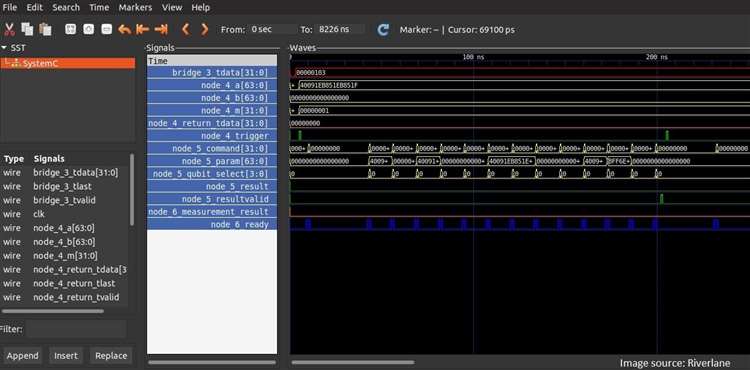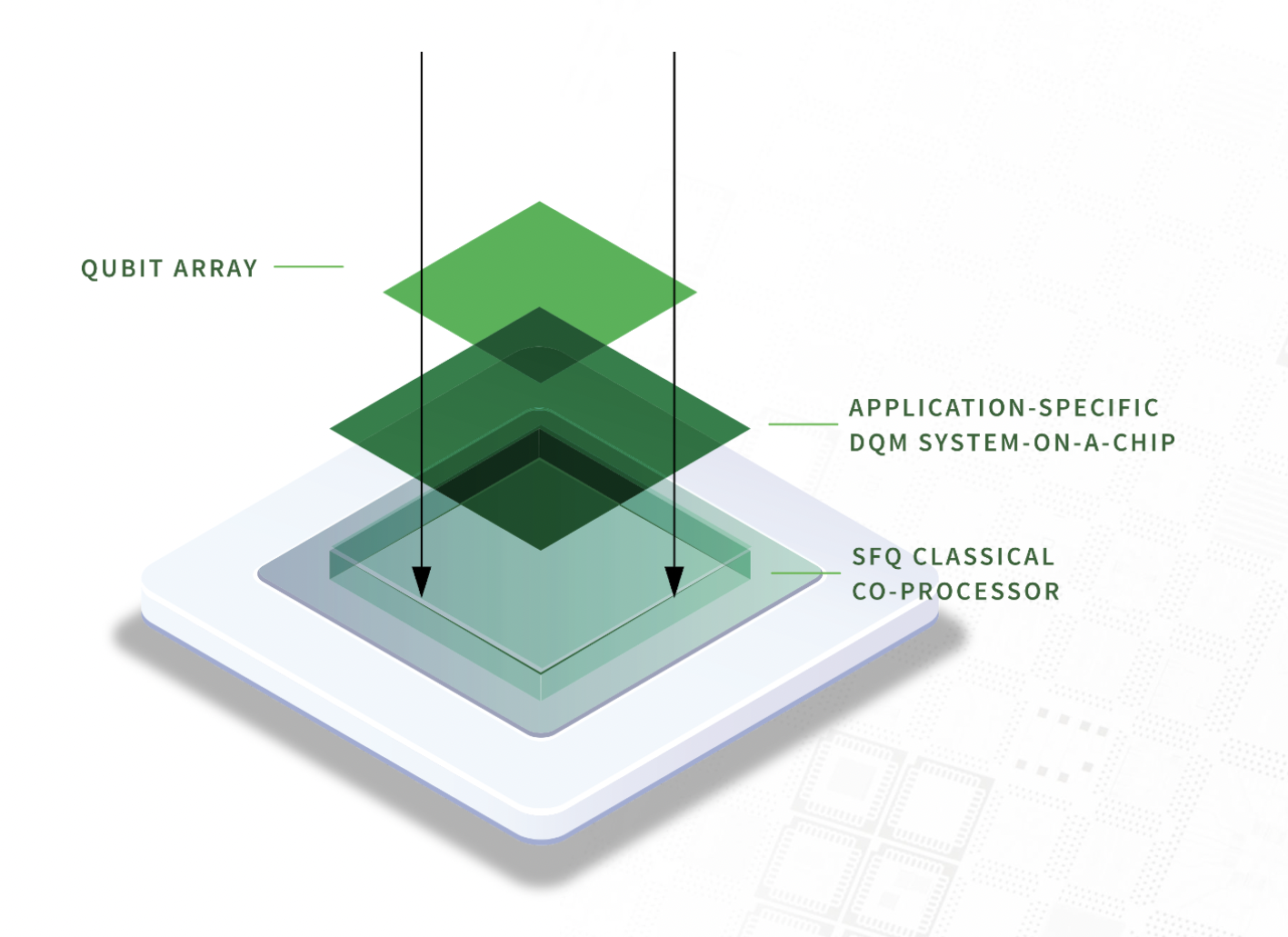Quantum Computing on a Chip: Brace for the Revolution
The development is being compared to the desktop computing system revolution of the 1960's.
In a moment of triumph that’s being hailed as equivalent to the move from room-scale silicon technology down to desk-sized machines, quantum computing has now gone chip-scale — down from the room-scale contraptions you might have seen elsewhere, including in science fiction.
The development has been spearheaded by Cambridge-based quantum specialist Riverlane’s work with New York and London-based digital quantum company Seeqc. They’re the first to deploy a quantum computing chip that has an integrated operating system for workflow and qubit management (qubits are comparable to classical computing’s transistors, but capable of pairing between themselves, instantly sharing information via quantum states, and also capable of representing both a 0 and a 1). The last time we achieved this level of miniaturization on a computing technology, we started the computing revolution. Now, expectations for a quantum revolution are on the table as well, and the world will have to adapt to the new reality.

The new chip ushers in scalable quantum computing, and the companies hope to scale the design by increasing surface area and qubit count. The aim is to bring qubits up to millions, a far cry from their current deployed maximum of a (comparatively puny, yet still remarkably complex) 76-qubit system that enabled China to claim quantum supremacy. There are, of course, other ways to scale besides increased qubit counts. Deployment of multiple chips in a single self-contained system or through multiple, inter-connectable systems could provide easier paths to quantum coherency. And on that end, a quantum OS is paramount. Enter Deltaflow.OS.

Deltaflow.OS is a hardware and platform-agnostic OS (think Linux, which populates everything from smartphones to IoT to supercomputers), meaning that it can serve as the control mechanism for various quantum deployment technologies currently being pursued around the globe. And even as multiple independent companies —such as Google, Microsoft, and IBM, to name a few — pursue the holy grail of quantum supremacy, Riverlane’s Deltaflow.OS is an open-source, Github-available OS that's taking the open approach for market penetration.
And this makes sense, since the more than 50 quantum computers already built around the world all operate on independently-developed software. It’s such a nascent field still that there are no standards regarding the deployment and control systems. An easily-deployable, quantum hardware-agnostic OS will undoubtedly accelerate development of applications that take advantage of quantum computing’s strengths, which at the 76 qubit system of China, already enables certain workloads to be crunched millions of times faster than the fastest classical, Turing-type supercomputer could ever hope to achieve.
To achieve this, Seeqc has effectively created a layered Digital Quantum Managament (DQM) SoC (System-On-Chip) that pairs classical computing capabilities with quantum mechanics. The company’s diagrams demonstrate what it calls an SFQ (Single Flux Quantum) co-processor as the base layer of the design, which enables the OS to be exposed to developers with a relatively familiar interface for interaction with the qubits. This offers the capability to “perform digital qubit control, readout and classical data processing functions, as well as being a platform for error correction.”
There are numerous advantages to be taken from this approach, as the SFQ’s resources are “(...) proximally co-located and integrated with qubit chips in a cryo-cooled environment to drastically reduce the complexity of input/output connections and maximize the benefits of fast, precise, low-noise digital control and readout, and energy-efficient classical co-processing.” Essentially, some tenets of classical computing still apply, in that the closer the processing parts are, the more performant they are. This enables the OS to run, and is layered next to an active qubit sheet that actually performs the calculations.
Get Tom's Hardware's best news and in-depth reviews, straight to your inbox.

Quantum computing has long been the holy grail in development for new processing technologies. However, the complexity of this endeavour can’t be understated. The physics for quantum computing are essentially being written as we go, and while that is true, in a way, for many technological and innovation efforts, nowhere does It happen as much as here.
There are multiple questions related to quantum computing and its relationship to classical computing. Thanks to the efforts of Riverlane and Seeqc, the quantum computing ecosystem can now “align their needles” and collectively problem-solve for deployment and operation of quantum-computing-on-a-chip solutions.

Francisco Pires is a freelance news writer for Tom's Hardware with a soft side for quantum computing.
-
tekmanro I sincerely doubt the claim that they have qubits (plural) on a wafer. The linked article talks mostly about an OS running on traditional (non-quantum) processors that could interface with (theoretical?) chip-scale qubit wafers.Reply
If someone developed a qubit that takes less than a freezer of space to "run" (let alone do anything other than generate random numbers) that would be big breaking news all over the internet. -
Eximo Yes, the article does a good job of avoiding it, but they are basically saying they have made a standard chip with circuitry designed for connecting to quantum processors. It doesn't do any quantum computing or host any qubits.Reply
"proximally co-located and integrated with qubit chips in a cryo-cooled environment to drastically reduce the complexity of input/output connections and maximize the benefits of fast, precise, low-noise digital control and readout, and energy-efficient classical co-processing.”
So the actual quantum computer still requires a cabinet sized cooling system. -
Sippincider Replyezst036 said:Can it run Crysis?
Can it run Breakout and Minesweeper? 🕹
It‘ll help with Humanity’s last days, when artificial intelligence meets low-cost mass-produced quantum chips… -
ingtar33 Replyezst036 said:Can it run Crysis?
It both can and can't run crysis. your cat may also be both alive and dead if you get one of these. -
VforV So this in 10 years or more?Reply
Ok, should have said that, no click bait please... :cautious: -
TerryLaze Reply
No it both can't and also can't run it and no quantum CPU will ever be able to run any games without any traditional cores, it's a completely different sort of calculations.ingtar33 said:It both can and can't run crysis. your cat may also be both alive and dead if you get one of these.
Quantum computing will be huge for simulating different things, the human brain among them, but it won't do much of the things that normal people need.
In the far future it will probably end up just like physX as a coCPU in a GPU to simulate complex systems like hair or leaves on trees or weather or enemy AI. -
AndyNorwich I make no claims for being a clever scientific person, but I have read so many times in my life time, scientific statements that say we will never be able to do something. Now 30-50 years later we are all doing those things. Think back to the possibility of a computer in any form being used within the home, when was that first even considered a possibility, not something that cannot be done?Reply
It was only during the 2nd World War that it was deemed possible by scientists for a computer to be housed in a very big property, a computer which as we know now was far less powerful than compare to a mobile phone today. Those same technical wizards were far from thinking we could all have one on our table tops in the 1980's, or one on our wrists in the 1990’s! (I still own an old Seiko computer watch from 1984)
So, while quantum processors cannot do PC/Turing functions as we speak, we cannot rule it out, we cannot say it cannot happen.
If I was able to live long enough to collect the winnings, I would eagerly wager a few thousand pounds today at say 1,000,000 to 1 that quantum processors will be able to 'play Crysis' (or simulate a powerful PC computer and graphics card environment) within the next 40 years. We are only at the very beginning still in terms of understanding and using quantum processing, let’s look forward to the near future when it becomes normal for everyone to have access to, and use, Quantum processing in everyday life (Some of us playing old PC games on handheld quantum devices!). -
Eximo The primary goal is quantum cryptology, I suspect the first consumer grade hardware is just going to be for secure communications, not calculating anything in particular. And the quantum internet, in part, is probably going to happen before that. No need to encrypt streaming services and other content, but VPNs, email, and other more worthwhile things. HTTPQ or something like that at some point.Reply